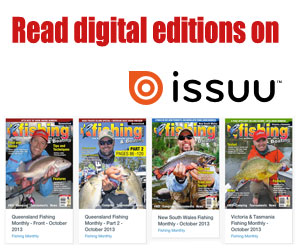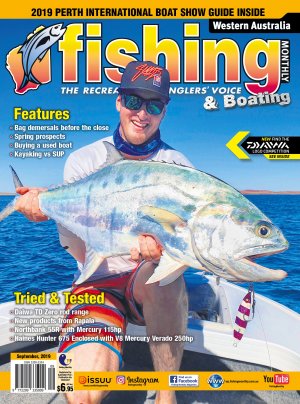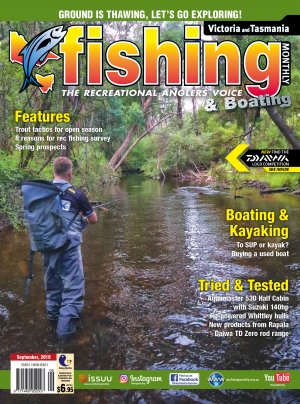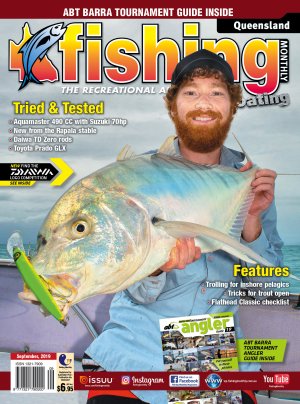At this time of the year, many anglers put away their fishing gear as they think an afternoon at the footy with a meat pie is more appealing than catching fish in the cold.
The diehards will still be at it and while many find the fishing slower than during the warmer months, there's always something to be caught.
Many believe than all bass go to spawn in the brackish waters during the cooler months but there is evidence to suggest that not all mature fish make the migration to brackish water.
There is also a growing view that the fish that do make their mind to spawn don't all make the big swim in a mass exodus. Waves of fish make the migration that extends through the Winter months and possibly into early Spring.
Those fish that don't decide to migrate will choose to remain in the areas they have inhabited over the warmer months and leave it for another year to spawn.
For those who simply can't get enough of bass and don't wish to target them in their spawning areas, this means there are still other areas where there is every likelihood of catching big fish. Anglers who fish in these areas can find it to be quite a challenge but they will often be rewarded for their patience and perseverance.
With the water decidedly cooler than during Summer, fish can be a lot less active. With water temperatures that has averaged around 27° to 28° over Summer, it's not hard to understand why fish will be a little less active when water hovers around a chilly 12° by the end of this month.
If you're looking for water that will be slightly warmer and more comfortable for fish, search along rocky banks and shorelines. It's quite surprising to see the increase in temperature in these areas.
A good sounder with a temperature gauge makes for some great experimenting.
If you're looking to continue targeting bass this month, being prepared to experiment with your presentations will often be the key to success.
Lures that are ideal for slower retrieves are going to be the best choice and top of the list of contenders would be soft plastics.
These are best worked dead slow and to heighten their appeal to bass, add some scent to them as well. The best ones leave a visible trail in the water and it's not hard to see how easy it is for fish to track down a soft plastic which leaves a nice trail behind it.
Every 10 to 15 casts, reapply the scent. Some anglers like to apply two different scents to the plastic.
Those who use scents would probably say that adding scent is as much a confidence thing as a real belief in the claims made by the scent manufacturers.
I'd have to say that they seem to have some physical benefit but they definitely make me feel more confident when I have my favourite scent applied to my lures and plastics. They certainly seem to get more fish on the scoreboard when I use them, so whatever the reason, they work.
Another approach on quiet fish is to use suspending lures. My favourite for this has been the Halco Sneaky Scorpion, which has turned a quiet afternoon into an exciting one. One of the best areas to target fish with these lures is around the towers of weed in the Nepean.
When things are quiet and nothing seems to be working, why not experiment with your lures and see what you can learn? Developing confidence in your gear is most important and on the water is the best place to get it all together.
Instead of just casting a lure and expecting it to catch fish, work out what you can really do with it and you'll develop more confidence. Everybody seems to have their ‘confidence lures’ but those who really do well on the water know how to make their lures perform.
There have been times when I've decided to go out and just experiment with my lures and those have made future sessions very productive. Experimenting with a few different lures and taking notes about your experiments might seem a little extreme but it's amazing what you can learn and how easy it is to forget what you've discovered.
There are always other species to encounter apart from the highly-targeted bass. Bream, jewfish, flathead and estuary perch are still about.
Traditionalists will continue to target bream, flathead and jewfish on bait strips but everyone these days knows how effective soft plastics can be on flathead. An increasing number of anglers are also proving that jewfish are also willing lure-takers so there are still great options for lure casters in Winter.
Bream and estuary perch can be targeted using bass-type lures bream.
An hour or so either side of the tide changes seems to be the preferred time according to one old timer I met. He uses nothing but bait and always lands enough fish for a nice meal for the family. Around Lower Portland to Wisemans Ferry is a good area to try for them.
If you've decided that the next few months of footy is more appealing than fishing, resist the urge to simply pack away your gear and forget about it until September or October.
If you've got a boat equipped with a two-stroke motor, drain the fuel from the motor and the fuel tank or you're likely to have problems in the new season. If you've ever been in a boat that is using stale two-stroke fuel you'll know what I mean.
Left for too long, oil and petrol left together can form a slime in your motor that can mean a boat will have performance capabilities worse than a Sydney Harbour ferry.
It's always interesting to see the antics boat owners when the weather warms up and they decide to hit the water again. If they'd done a little bit of preventative stuff before they packed their boats away, there'd be a lot less free entertainment for the rest of us.
Think about your tackle, too. Work out the replacement value of your fishing tackle and then ask yourself is it worth doing the right thing and doing a little bit of work to keep it in order.
Checking the condition of your tackle before you store it makes sense. Clean and check rod guides (a cotton bud is useful to detect invisible nicks and burrs), lube reels and loosen drags, check line condition and replace if necessary and go over the hooks and split rings on your lures to ensure they’ll be in good condition from the first cast next season.
Losing a great fish due to poorly-maintained gear is bad news.
If you have any news or fishy pics, email them to me at --e-mail address hidden-- or phone 0418 297 353.
Reads: 872



